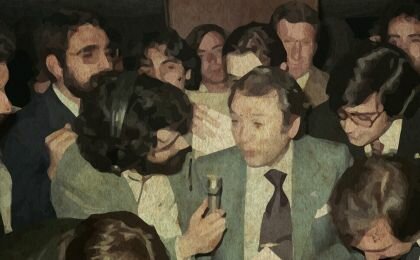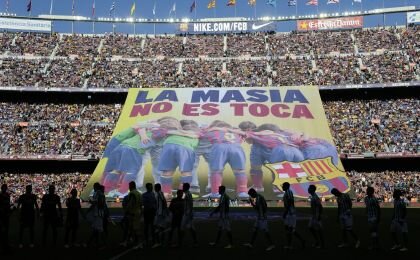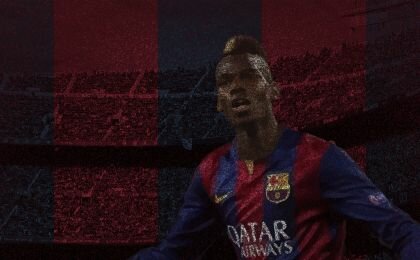 opinions | 2015-07-10
opinions | 2015-07-10
Óscar García - His career as a player and unfair departure from Barcelona
The career of one of Barcelona's best young coaches that left the club through the backdoor.
Óscar García Junyent was a promising La Masia player who came from Sabadell at the age of 9, and who played for all of Spain's youth teams. Although he was seen as Bakero’s successor at Barcelona, he didn’t get many chances on his first four years with the first team because he could not successfully compete for a place in the Dream Team, the golden generation managed by Johan Cruyff.
Later he was loaned out to Albacete, where he spent the 1994/95 season, and did well enough to return to Barcelona and played a relevant role in Cruyff's final year in charge, scoring 10 goals in 11 matches in what would become a season where the club lost the chance of winning the treble (La Liga, Spanish Cup, and UEFA Cup) in its last two weeks.
Johan Cruyff was one of Óscar’s biggest inspirations and the person who instilled in him the way he viewed football: The style and the philosophy he liked and was part of. Even though Cruyff left, Óscar remained in the squad until he decided to sign with Valencia in 1999, staying for one season, scoring some beautiful goals, but wasn't a fit for a team with such physical style. He later played for Espanyol for four years, from 2000 to 2004, with several ex-La Masia players, including his brother, Roger García. He retired at Lleida due to recurring injuries at 32.
Óscar’s playing style was once described as “a 6 who could play as a 4, but had the ability to attack like an 8 and could finish like a 9,” which means he could run and organize the team, but could also be a pivot, with the ability to dribble, enter the box, and be a reliable finisher: A useful midfielder for Barcelona's system, a player Cruyff himself believed in. Óscar could read matches well; he could unlock its spaces, and, besides being technical, he was also a very intelligent player.
It's fair to say he suffered from the same fate Thiago Alcântara went through at Barcelona: Being a midfielder who could play anywhere and was certainly good enough, but was unable to find his optimal position due to lack of time, thus failing to turn into a vital part of the team. The fans will always remember Óscar García as a La Masia player who didn't fulfill expectations, but was capable of providing something useful to the club, and the Camp Nou crowd knew it.
Here’s what Óscar himself said about his playing career in 2014: “Óscar the coach would not pick Óscar the player. I made a mistake when I was a player because I thought I knew everything. It was too easy for me and that was a big mistake. I had a lot of talent and maybe I thought I didn’t have to work as hard. I do not want to repeat that mistake as a manager. Everybody said I could have been so much better, but as a manager I will be, I will be the best I possibly can.”
Between 2005 and 2009, Óscar considered following a career as a football pundit; he was already taking notes of several matches he watched. Football, and the philosophy he was brought up in, was what he loved. After these four transitional years from player to coach, he enrolled in a course to get his coaching credentials.
He began as Catalonia’s U-18 team coach, and then Johan Cruyff himself invited him to be his assistant in the main team. Later, with the required credentials tucked under his belt, he returned to La Masia and started to manage Juvenil A for the 2010/11 season. Toward the end of 2011, he graduated as a professional football coach. Óscar spent two seasons at La Masia winning trophies with the Juvenil A team.
In his first season as a Juvenil A coach, his team won all three possible titles, was defeated only three times in 50 matches, and with over a hundred goals scored, helping develop players like Rafinha, Deulofeu, Icardi, and Dongou.
He was set to replace Luis Enrique at Barcelona B, but that wise sporting choice was overruled by the Barcelona board, Sandro Rosell especially, who didn't like the idea of having a die-hard Cruyffista on their ranks. Instead, Eusebio was installed to replace Lucho. Eusebio stayed in the B team for three years and failed to significantly develop La Masia prospects for the first team.
Although he was unsatisfied with the situation, Óscar García stayed for another year at the club Juvenil manager because Zubizarreta promised him that he would replace Eusebio in the coming season. But Eusebio’s contract as Barcelona B manager was renewed a month after that empty promise. To add insult to injury, Óscar’s key players at Juvenil A were constantly misused by the B team manager; most of the key players would get called for the B team but would not be extensively used.
Óscar couldn't cope without vital players, and eventually lost in the Next Gen Series to Ajax. That day not a single board member went down to the dressing room to compliment the kids for their effort. They lost the league in the final round, Dongou was called up by Eusebio, who didn't even use the youngster that day, so the Óscar realized he had to leave, that the way he saw football and his close relationship with Cruyff was hurting him inside his own club, the club that owes its greatest glories to the Dutchman.
The coach decided to coach Maccabi Tel Aviv in Israel after being invited by Jordi Cruyff, eventually breaking a 10-year title drought while applying the system he was raised in as a footballer, the system he learned from Cruyff himself. Óscar was so successful that even the opposition would come up to him to congratulate him for how his team was playing, and some were inspired to try something similar. The Israel National Team, which rarely called up Maccabi players, started to call five to six players from Óscar's squad. The National Team itself was inspired by the brand of football Óscar took to the Middle East.
His first year in Israel was successful, but Óscar missed his family and left the country to manage Brighton in England's second division in the 2013/14 season, taking them to a historical play-off, and was only knocked out in the semifinals, finishing sixth. He returned to Israel, but left again shortly after due to conflicts in the region. In September 2014, he signed for Watford but had to leave due to health issues.
Today, Óscar García is fully recovered and is currently working as a pundit in Spain, working for radios and writing for newspapers. He plans to return to coaching soon.
Here are some quotes from Óscar regarding his playing style and philosophy:
“You need the ball, but to also know what to do with it. The ball has to run, but it doesn’t mean that the player has to run as much as it, even though it’s evident the player must be very well prepared to enter such dynamic. You need physical work with a great focus on the right mentality. You must be really prepared for it and must be willing to give your best for the idea. When you see how the players respond is when you know you got things right.”
“You get things right as a coach and leader when you see the players are involved. They are always positive around you. You can ask them for 10, and they give you 12. You can notice it in their eyes when they arrive for training. And when the training session is done, there are some who stay to “practice”. Such things, small details, are what matters most when the actual match starts. And I was raised like that, since I was in La Masia.”
When asked if he would ever coach Barcelona's first team in 2013, Óscar said: “Nobody knows that right now. If I’ve learned something is not to build castle out of air. If they ask me if I wanted to, the answer is evident. It wouldn’t be for the money or the prestige or anything else: Being considered to coach the club of your life is priceless. If that ever happens, I can’t tell. I have no idea. Sometimes, life changes around you in a second. And someone opens a door you never even knew was there.”
The views and opinions expressed on this article are of the author only and do not reflect those of Grup 14 or any of its members. The content here belongs to Grup 14 and its many collaborators.








